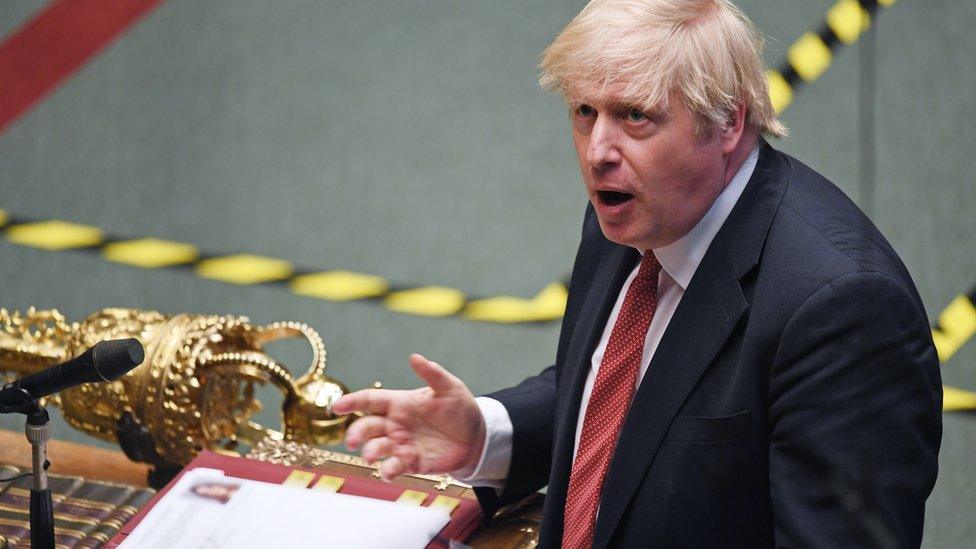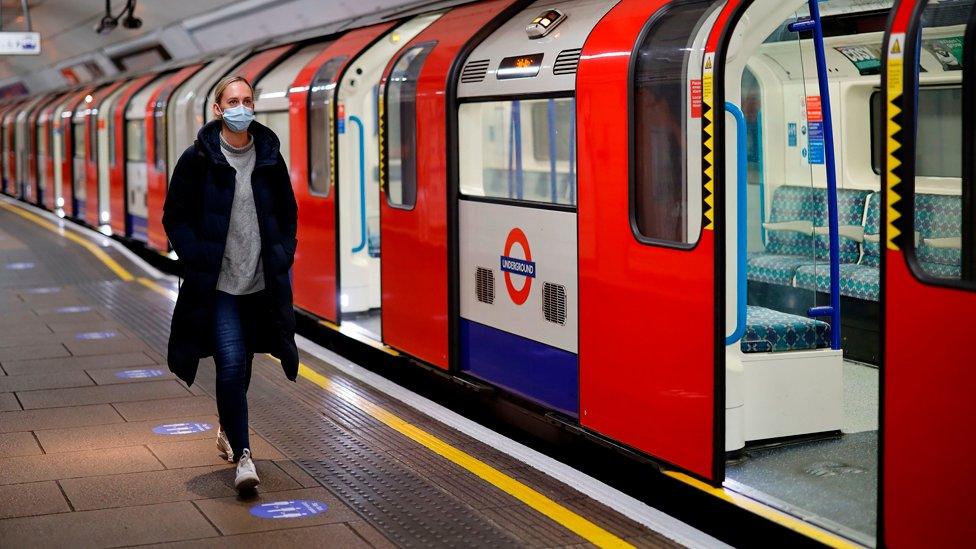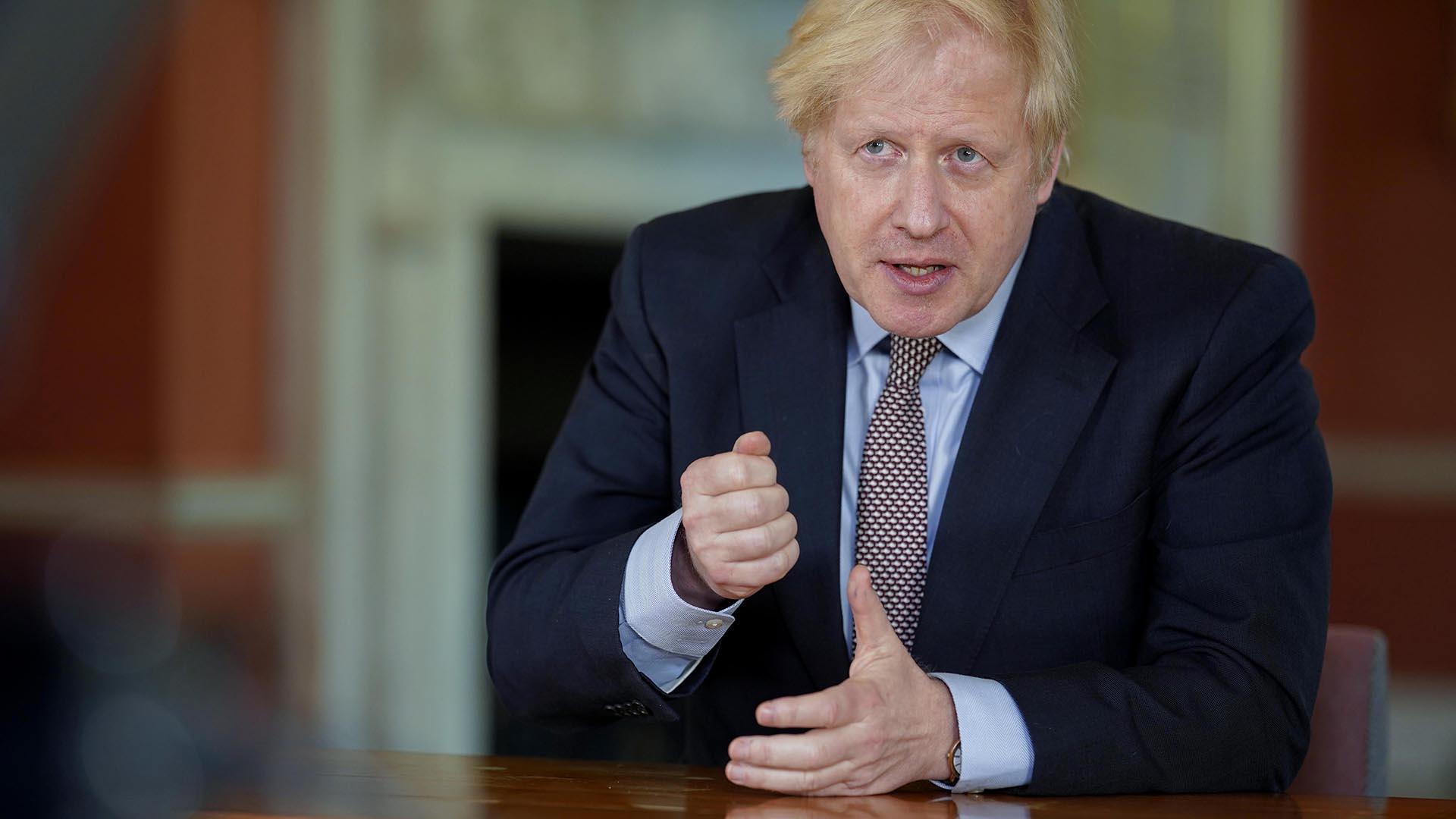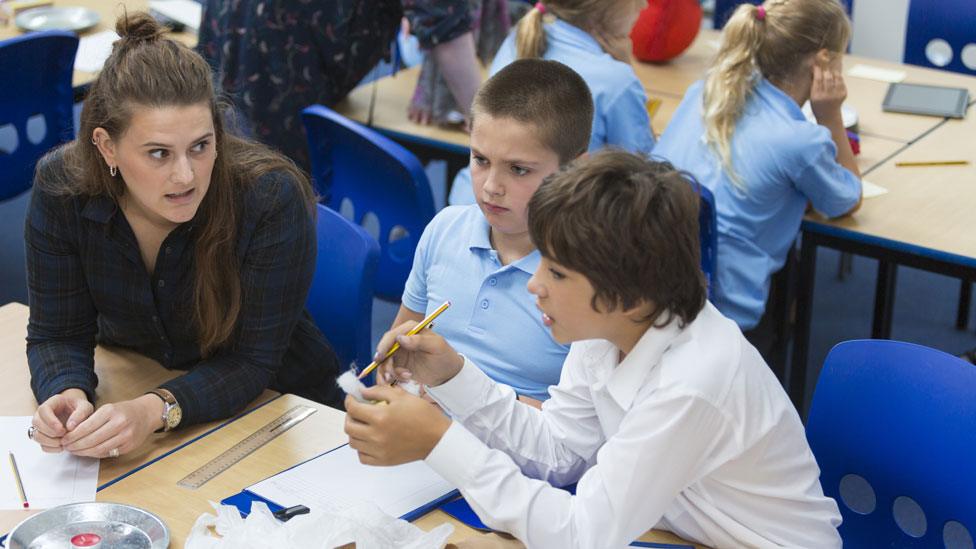Coronavirus: PM 'not expecting' flood of people back to work
- Published
- comments
"Employers will not be allowed to get away with forcing people to work in conditions that are not Covid-secure"
A "sudden big flood" of people returning to work is not expected after the release of new coronavirus guidance, Boris Johnson has said.
The PM said measures, including encouraging people in England to return to work if safe, were "baby steps".
He also said employers should be sympathetic to workers who do not have access to childcare.
It came as new rules said people in England can soon meet one person from outside their household, at a distance.
From Wednesday, people can socialise in open spaces or play one-to-one sport such as tennis with another person, as long as they stay 2m apart.
Mr Johnson used Monday's daily Downing Street briefing to clarify his return to work message, saying employers would need to prove they met a new safety standard, dubbed "Covid secure".
He said: "I don't think any of us expect that tomorrow or for the rest of this week there is going to be a sudden big flood of people back to work.
"I think a lot of people will now start to think whether they fall into that category, whether they could think about going back to work."
'Spot inspections'
He told people in England their workplaces "must be safe, must be Covid secure and employers will not be allowed to get away with forcing people to work in conditions that are not Covid secure".
"Everyone must obey social distancing and we're going to have a lot more inspections by the Health and Safety Executive (HSE), we'll have a random spot inspections to check that companies are doing the right thing," he said.
"If people find themselves in conditions that they think are unsafe, then they should immediately report it and we will take action, and that goes for all work."
It comes as a further 210 people have died in the UK after testing positive for coronavirus, taking the total number of deaths recorded to 32,065, external.
After eight days of missing its goal of 100,000 tests a day, on Monday the government counted 100,490 tests on 10 May.
Sir Patrick Vallance, the UK government's chief scientific adviser, told the Downing Street briefing that Office for National Statistics data suggests an estimated 136,000 people were currently infected with coronavirus in the UK.
He said the amount of time it may take for this number to halve is around two weeks on current infection rates.

LOCKDOWN UPDATE: What's changing, where?
SCHOOLS: When will children be returning?
EXERCISE: What are the guidelines on getting out?
THE R NUMBER: What it means and why it matters

Earlier, the government published new guidance for the public, external, as well as a lengthy strategy document, external, on the next steps in its coronavirus response in England.
The information includes new advice for people in England to wear face coverings while on public transport and in some shops.
It also set out how, from Wednesday, people in England will be allowed to meet one person from outside their household as long as they stay outdoors and stay 2m apart.
Sage, the government's group of scientific advisers, said the risk of infection outside is significantly lower than inside, according to the strategy document.
Mr Johnson told Parliament the public should exercise "good, solid, British common sense" in adapting their lives to the next phase of the coronavirus response.
But Mr Johnson defended the differing approaches between the UK nations after leaders in Scotland, Wales and Northern Ireland said "stay at home" messages remained in place there.
"For those who think that the 'stay alert' is not the right message, I think it is absolutely the right message for our country now," he said.
Scotland, Wales and Northern Ireland all have devolved powers over their own lockdown restrictions.
It comes as the Department for Business, Energy and Industrial Strategy released new guidance for UK employers, external on how to implement social distancing measures, with eight separate documents published for sectors which can now reopen.
The HSE has been given £14m in funding for extra call-centre workers, inspectors and equipment.
The guidance for employers says they could be Covid secure by re-designing workplaces with 2 metre (6ft) distances in mind, staggering start times, building one-way systems and publishing detailed risk assessments.
The Trades Union Congress said the new guidelines were "a step in the right direction".
Meanwhile, Labour leader Sir Keir Starmer used an official response to the PM's coronavirus address on Sunday to urge further clarity and reassurance for workers and parents that returning to work and school would be safe.
In a recorded statement, Sir Keir Starmer said the UK couldn't "go back to business as usual" after coronavirus
The new guidance said the government's ambition was for all primary school children in England to return to school for a month before the summer. Childminders in England will also be permitted to look after children again.
Fresh guidance published for primary schools on Monday night said class sizes should be limited to 15 and drop-off and pick-up times staggered when they are able to return.
Asked during the Downing Street briefing what people should do in the meantime if they do not have access to childcare and cannot work from home, Mr Johnson said he was sure employers would be understanding.
"If people don't have access to childcare and they have a child who isn't back in school then I think that's only fair to regard that as an obvious barrier to their ability to go back to work and I am sure employers will agree with that," he said.

The PM told Parliament the government's "roadmap" would help control Covid-19
Meanwhile, the guidance confirmed garden centres will also be able to reopen on Wednesday with distancing measures in place.
It is likely that the government will continue to advise people who are clinically extremely vulnerable to continue to shield beyond June, the strategy document added.
The 60-page document also said:
People in England can drive to any outdoor open space in the country - but not to other UK nations whose rules should be respected
Healthy people aged 70 and over should take particular care to minimise contact with others - even if they have not been advised to shield by the NHS
Clothes should be washed regularly if people work with others outside of their household
Doors and windows should be left open in places where people from different households interact
A "rapid re-engineering of government's structures and institutions" is needed to deal with Covid-19
Fines for those who do not follow the rules in England will increase from £60 to £100 from Wednesday, with maximum total penalties for repeat offenders of £3,200.
Speaking about potential future measures, Mr Johnson told MPs the government was exploring how to safely allow people to expand their household to include one other "on a strictly reciprocal basis".
The new guidance also reflected the government's three-step plan, announced by the PM on Sunday night.



CORONAVIRUS QUIZ: Fact or fiction?
BRILLIANT BAKES: Recipes we've turned to in lockdown

- Published11 May 2020

- Published10 May 2020

- Published10 May 2020
- Published10 May 2020
